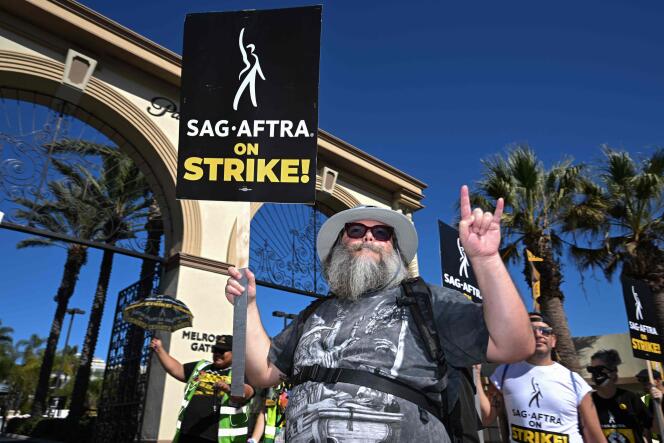Filming should resume soon in Hollywood. Actors and major studios reached an agreement on Wednesday, November 8, to end the strike which has paralyzed the production of films and series in the United States for many months and which has cost the American economy billions. , announced the actors’ union SAG-AFTRA. The exact content of the agreement has not yet been revealed, but “further information will be communicated” Friday, the union said.
“The strike will officially end on Thursday, November 9 at 12:01 a.m.”, Los Angeles time, the organization said in a statement. A ” agreement in principle “ was found after 118 days of strike by actors, who demanded better remuneration in an industry disrupted by the advent of streaming, and safeguards in terms of artificial intelligence.
For stars and extras to return to the sets and allow filming to resume, the 160,000 actors, dancers, stuntmen and other members of SAG-AFTRA must still approve their new collective agreement by a vote, a step seen as a formality.
Negotiations with the studios have taken place almost daily over the past two weeks, often with the CEOs of Disney, Netflix, Warner Bros and Universal in person at the table, as the need to end this social movement grew. more pressing.
Offbeat film and series releases
Except for a minority of stars, most of the actors encountered real financial difficulties as the strike lasted, some even had to turn to other jobs. The studios had gaping holes in their release schedules for next year and beyond. After the postponement of major productions, such as the second part of the “Dune” saga or the “Stranger Things” series, they will now want to get back to work as quickly as possible.
The sector has just gone through a double historic social movement: when the actors went on strike in mid-July, the screenwriters had already stopped work since the beginning of May. Hollywood had not experienced such a crisis since 1960, when Ronald Reagan, who later became president of the United States, headed the actors’ union. In total, the paralysis of the sector in recent months has cost at least $6 billion, according to recent estimates by economists.
Actors and screenwriters shared one observation: apart from star actors and star “showrunners”, most of them were no longer able to earn a decent living in the era of streaming. Not only because the platforms produce series with far fewer episodes per season than on television, but also because Netflix and others have drastically reduced the revenues due to each rebroadcast of films and series.
Unlike television, where a rebroadcast can be paid for through the advertising model based on audience figures, a streamed work was subject to a flat rate payment, regardless of the popularity of the program.
An increase in the minimum salary of 8% for screenwriters
The studios finally reached an agreement with the writers at the end of September and most of them have since returned to work. But despite this progress, negotiations with the stakeholders seemed to be at an impasse. To get out of this, the two parties have found, according to the specialist press, a compromise on the minimum wage, which should increase by around 8% compared to the previous three-year agreement: this is the highest increase in decades, even if it remains below the initial demands of the actors. On the streaming side, a bonus system for actors playing in successful series or films will be put in place.
The World Application
The Morning of the World
Every morning, find our selection of 20 articles not to be missed
Download the app
The supervision of artificial intelligence (AI) was another major point of tension, particularly in the final stretch of the negotiations. Actors fear that studios will use this technology to clone their voices and images, in order to reuse them in perpetuity without compensation or consent. The studios had made proposals, but the actors’ union believed that these measures did not go far enough. In recent days, the two parties have notably fought over the conditions surrounding the studios’ rights to the image of star actors after their death.
